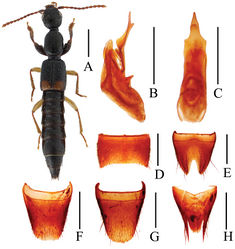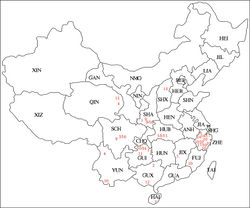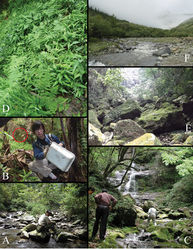Lobrathium pengi
| Notice: | This page is derived from the original publication listed below, whose author(s) should always be credited. Further contributors may edit and improve the content of this page and, consequently, need to be credited as well (see page history). Any assessment of factual correctness requires a careful review of the original article as well as of subsequent contributions.
If you are uncertain whether your planned contribution is correct or not, we suggest that you use the associated discussion page instead of editing the page directly. This page should be cited as follows (rationale):
Citation formats to copy and paste
BibTeX: @article{Li2013ZooKeys304, RIS/ Endnote: TY - JOUR Wikipedia/ Citizendium: <ref name="Li2013ZooKeys304">{{Citation See also the citation download page at the journal. |
Ordo: Coleoptera
Familia: Staphylinidae
Genus: Lobrathium
Name
Lobrathium pengi Li & Li sp. n. – Wikispecies link – ZooBank link – Pensoft Profile
Type material
(7 ♂♂, 3 ♀♀). Holotype, ♂: “China, Guangxi, Shangsi County, Shiwanda Shan, Forest Park, 300–500 m, 21°54'N, 107°54'E, 25–IV–2011, Peng Zhong & Zhu Jian-qing leg. / Holotype ♂, Lobrathium pengi, sp. n. Li & Li, det. 2013”. Paratypes, 6 ♂♂, 3♀♀: same data as holotype.
Description
Body length 6.34–7.34 mm, length of fore body 3.11–3.73 mm. Habitus as in Fig. 12A. Coloration: body black, elytra in posterior 1/3–2/5 with subcircular yellowish spot reaching posterior, but not lateral margins; legs yellowish with forelegs brown to blackish, femora and protibiae and tarsi paler; antennae brown.
Head weakly transverse (HW/HL = 1.02–1.03); posterior angles not marked; punctation coarse and dense, sparser in median dorsal portion, interstices without microsculpture. Eyes large, more than half as long as the distance from posterior margin of eye to neck. Antenna slender, 1.68–1.82 mm long.
Pronotum nearly as wide as head (PL/PW = 1.13–1.33, PW/HW = 0.97–0.98), lateral margins weakly convex in dorsal view; punctation dense and coarse, similar to that of head, but with impunctate midline; interstices without microsculpture and glossy.
Elytra broader than pronotum (EL/EW = 1.0–1.06, EW/PW = 1.35–1.40, EL/PL = 0.98–1.12); humeral angles marked; punctation coarse and dense. Hind wings fully developed.
Abdomen distinctly narrower than elytra; punctation fine and dense; posterior margin of tergite VII with palisade fringe; tergite VIII (Fig. 12F) without appreciable sexual dimorphism, with weakly convex posterior margin.
Male. Sternite VII (Fig. 12D) strongly transverse, posterior impression of triangular shape and impunctate, posterior margin broadly and concave; sternite VIII (Fig. 12E) weakly transverse, without modified setae, posterior excision deep and rather narrow, on either side of this excision with long dark setae; aedeagus (Fig. 12B, C) approximately 1.0 mm long, ventral process of very distinctive morphology, slender and furcate apically, bifurcation forming an angle of more than 30 degrees in lateral view.
Female. Sternite VIII as in Fig. 12G; tergites IX-X (Fig. 6H) relatively short; tergite IX undivided anteriorly, anterior martin emarginated in the middle; tergite X of subovoid shape.
Etymology
The species is named after Zhong Peng, collector of the type specimens.
Comparative notes
This species is similar to Lobrathium diaoluoense, from which it is separated by the broader and apically more abruptly narrowed ventral process of the aedeagus, with the apical bifurcation forming an angle of more than 30 degrees in lateral view.
Habitat and distribution
The specimens were sifted from wet moss along a streamside (Fig. 20E) in the Shiwanda Shan, Guangxi (Fig. 19), in April.
Original Description
- Li, W; Zhao, M; Dai, C; Li, L; 2013: New species and records of Lobrathium Mulsant & Rey (Coleoptera, Staphylinidae, Paederinae) from China ZooKeys, 304: 49-81. doi
Images
|



